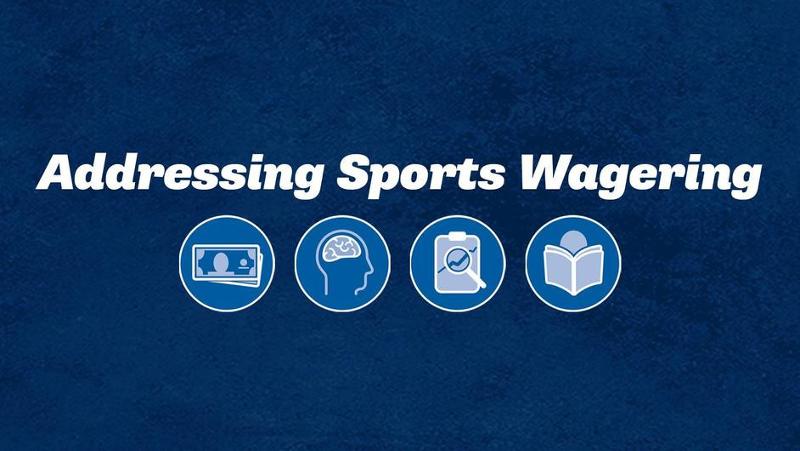The National Collegiate Athletic Association (NCAA) has taken a proactive step in addressing the risks associated with sports betting by launching an innovative e-learning module. This module aims to educate over 500,000 current and future student athletes about the potential harm that betting can cause to themselves and the integrity of competitions. With the participation of notable athletes like Zaire Franklin, the NCAA hopes to raise awareness and protect student athletes from the dangers of sports wagering.
The Importance of Educating Student Athletes
Highlighting the significance of educating student athletes about the risks of sports betting
Student athletes are not immune to the allure of sports betting, and it is crucial to educate them about the potential risks involved. The NCAA's e-learning module aims to provide comprehensive information to over 500,000 student athletes, ensuring they understand the dangers of gambling and its impact on their well-being and the integrity of sports competitions.
By raising awareness and providing valuable insights, this initiative seeks to protect student athletes from the harmful consequences of sports wagering. Let's delve into the importance of educating student athletes about the risks associated with sports betting.
The NCAA's E-Learning Module: A Comprehensive Tool
Exploring the features and benefits of the NCAA's e-learning module on sports betting risks
The NCAA's e-learning module is a powerful educational resource designed to equip student athletes with the knowledge they need to make informed decisions about sports betting. This comprehensive tool covers various aspects, including:
- The potential harm of sports gambling on mental health, finances, and future prospects
- The impact of betting on the integrity of sports competitions
- The rules and regulations surrounding sports wagering
- Recognizing and avoiding risky betting behaviors
By engaging with this module, student athletes gain valuable insights and practical strategies to protect themselves and maintain the integrity of the games they participate in. Let's explore the features and benefits of the NCAA's e-learning module in more detail.
Insights from Athletes: Zaire Franklin's Perspective
Discover how NFL player Zaire Franklin lends his support to the NCAA's e-learning module
Zaire Franklin, a prominent NFL player from the Indianapolis Colts, is among the athletes featured in the NCAA's e-learning module. Drawing from his own experiences, Franklin emphasizes the importance of thorough education on the rules and risks of sports betting for athletes at all levels.
As sports wagering continues to gain popularity, Franklin recognizes the need for athletes to protect themselves, their teams, and the integrity of their respective sports. His involvement in this initiative adds a personal touch and resonates with current student athletes, making the module more relatable and impactful.
Addressing the Issue: Problem Gambling among Student Athletes
Examining the results of surveys conducted by the NCAA on sports betting activities among student athletes
The NCAA conducted surveys among 18 to 22-year-old student athletes to gain insights into their sports betting activities. The results revealed some concerning trends:
- 58% of the surveyed athletes had engaged in at least one sports betting activity
- 16% had participated in risky bets
- 6% reported losing more than $500 in a single day
These findings highlight the existence of problem gambling among student athletes and emphasize the importance of addressing this issue. The NCAA's e-learning module aims to provide support and guidance to prevent further harm and promote responsible decision-making.
The Impact of First-Hand Experiences: Connecting with Student Athletes
Understanding the effectiveness of using athletes' first-hand experiences in educating student athletes about sports betting risks
The NCAA recognizes that athletes with first-hand experiences can effectively connect with current student athletes. This understanding led to the inclusion of notable athletes like Zaire Franklin in the e-learning module.
By sharing their personal stories and insights, these athletes create a relatable and impactful learning experience for student athletes. The module harnesses the power of real-life experiences to educate and empower student athletes in making informed decisions regarding sports betting.
Conclusion
Summarizing the significance of the NCAA's e-learning module in protecting student athletes from the risks of sports betting
The NCAA's e-learning module serves as a crucial tool in safeguarding student athletes from the risks associated with sports betting. By providing comprehensive education, insights from athletes, and practical strategies, this initiative aims to protect the well-being of student athletes and maintain the integrity of sports competitions.
Through the collective efforts of the NCAA, athletes like Zaire Franklin, and the participation of student athletes, this e-learning module creates a platform for awareness, education, and responsible decision-making. By equipping student athletes with the necessary knowledge, the NCAA is taking a proactive stance in ensuring the welfare of athletes and the integrity of collegiate sports.
Conclusion
The NCAA's e-learning module serves as a crucial tool in safeguarding student athletes from the risks associated with sports betting. By providing comprehensive education, insights from athletes, and practical strategies, this initiative aims to protect the well-being of student athletes and maintain the integrity of sports competitions.
Through the collective efforts of the NCAA, athletes like Zaire Franklin, and the participation of student athletes, this e-learning module creates a platform for awareness, education, and responsible decision-making. By equipping student athletes with the necessary knowledge, the NCAA is taking a proactive stance in ensuring the welfare of athletes and the integrity of collegiate sports.

